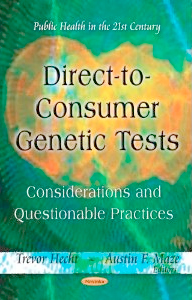The journey has begun, according to experts in this area of research but many roadblocks remain that could stall progress.3 Even when the science has been perfected, the successful implementation of personalized medicine is dependent on several factors:
- There is a critical need to educate health professionals. The science of genetics that is traditionally taught in medical schools remains limited, with little or no discussion of complex ”omic” information.
- The implementation of personalized medicine requires government support and regulatory oversight, as well as public vetting of ethical issues.
- Medical records systems must be structured to accept genetic data and to be integrated with the patient’s existing health record in a way that facilitates its use in clinical decision-making.
- For personalized medicine to become a reality, the need for tissue continues to be critical for research and must be donated by willing, informed individuals.
Direct-To-Consumer Marketing
There is an increasing movement to – market - medicines and medical care directly to the consumer. Ads on television and in the print media are constantly encouraging us to purchase a particular supplement or medication, claiming it can cure us of many ailments.
In addition, for many years, patients have been taking their own blood sugar levels and blood pressure readings, and current technology is creating more and more products we can use in our own homes to monitor our health. In fact, if we choose to, we can even test our own DNA.
But the question is, what should we do with all this information? Direct-to-consumer genetic tests are not designed to provide a clear-cut ”answer” as if one is pregnant or not pregnant.
The information received from genetic tests can be extremely complex and is best understood with the help of both doctors and genetic counselors who know you, Your medical history, your family history, and other crucial details.
Please think carefully before you take this type of step.




